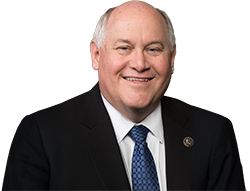Estes Joins the John Whitmer Show
Washington,
October 7, 2025
|
Hannah Rawles
((202) 225-6216)
U.S. Congressman Ron Estes (R-Kansas) joined the John Whitmer Show to discuss the Democrat-induced government shutdown and his work to preserve and protect Social Security as Chairman of the Social Security Subcommittee. Listen on YouTube and Rumble.
On House Republicans funding the government and what the appropriations process should look like: “We did our job several weeks ago, we –the House Republicans – voted to fund the government. [We] funded it till November 21st … The problem stems back to we haven't been doing regular order for a long time. “There's 12 appropriation bills that fund the different departments in the government and … the fiscal year runs from October 1st to September 30th and it's been since 1997 since all 12 of those have been done, completed, signed into law by September 30th. “The House Appropriation Committee has passed all 12 out of the Appropriations Committee, but unfortunately, the clock ran out on September 30, with all the other things we've been working on with DOGE and with the One Big, Beautiful Bill, the Working Families Tax Cuts, and other things, appropriations just didn't get done in time. “We've passed some of them out of the house. What the Speaker proposed and what we voted on several weeks ago was, ‘Let's keep funding the government at the current levels until November 21st, allow the appropriations process to work out, pass it through the House, pass it through the Senate, and whatever conference committee work gets done by passing those provisions.’ And the Democrats said, ‘No, we're not going to do that.’ … Even though they voted for these exact same funding levels in the appropriations last spring.” On Democrats refusing to vote for the same funding bill they voted for 13 times during the Biden administration: “It's just a continuing resolution, which basically means you spend at the current levels. You don't start new programs, you don't change or improve programs or redirect that. It's just keeping the government open, keeping it funded so that we can continue to pay our military, continue to pay our Customs and Border Patrol agents, continue to pay the TSA agents at the airport and air traffic controllers, all the things that a great nation has and should have. “The Democrats came back with an irrational proposal that says, ‘Well, just to fund it ‘til November 21st, we need to spend an extra 1.5 trillion dollars and do things like … give free health care to illegal aliens, and take money away from rural hospitals.’ I mean, that's what they're proposing to do in order to fund the government until November 21st.” On Democrats’ posturing to control the media narrative: “They're hoping to get the media on their side, which they have. I mean, the Democrat media is kind of redundant … and being able to talk about this message and make sure that there's enough angst out there. “The facts aren't on their side. I mean, Speaker Johnson pointed out on page 57 [of the government funding bill], ‘Here's right where you said you're not going to fund the government for every operation unless you give free health care to illegal aliens.’” On continued government payments during the Schumer Shutdown: “This is really focused on the discretionary spending, which is about 25% of the total spending of the government. So many other things are continuing to happen. “We're still sending out Social Security checks, still making Medicare and Medicaid payments, because those are … sometimes called mandatory programs or sometimes called entitlements. I call them automatic programs because they're set in law to happen based on the provisions that somebody's in, whether it's income or whether they've paid into Social Security or Medicare. But it gets back to the basics of the responsibility is to fund the government and make sure that we defend the country. Those are the two main responsibilities of the federal government.” On Democrats choosing to continue receiving their salaries during the shutdown they caused: “Yeah, it really is a bad thought process that [Senator Ruben Gallego]'s going through from the standpoint of saying he's voting to shut down the government, just like all but one House Democrat voted to shut down the government, including Kansas Democrat, only Democrat, Sharice Davids. “[Sharice Davids] voted to shut down the government. She voted not to fund the government, which in effect shut us down. So all of these people, all the military folks, all of the Customs and Border Patrol agents, all the air traffic controllers and TSA agents are not getting paid, but you have this senator who's said the quiet thing out loud. “The Democrats still want to get paid. Even though their staff, their own staff's not going to get paid. But for Senator Gallego to say that he wants to still get his paycheck regardless of what his staff's getting paid or the responsibilities he has to oversee the government. That's just irresponsible, particularly when he voted against funding the government.” On Democrat hypocrisy of shutting down the government: “I think this is a political position they're taking and it's as you said, the position they take depends on what politics and what political angle they want to play. When I pulled up, I was looking at some pictures of my phone from 2018, the last time we really had a Schumer Shutdown, and had a big picture of a sign out there of … let's stop the Schumer Shutdown and here we go again having another Schumer Shutdown just because the Democrats don't want to fund the government. “They don't want to step up and say, ‘Okay, we know we need to negotiate and have appropriation bills passed to fund the government,’ but instead of actually doing that or instead of allowing time to finish that work between the House and the Senate, they're saying, ‘Well, let's shut the government down’ so that they can inflict pain on the American people.” On predicting how long the Democrats will keep the government shut down: “Well, it's really in the Democrats' court. I mean, they have backed themselves into a corner by saying they're not going to fund the government unless they spend this extra one and a half trillion dollars, and it's just irrational from that standpoint. “So I'd like to think that they will have thought through this over the weekend, now that we've been shut down for almost a week, and look at an approach of saying, ‘Okay, so let's open up the government. Let's continue the discussions.’ “They still get input on the appropriation process. I mean, it's still going to take 60 votes in the Senate to overcome a filibuster to pass a bipartisan agreement on appropriations for the next fiscal year.” On Congressman Estes’ concerns for Social Security: “I chose to take the role of Chairman of the Social Security Subcommittee, which is part of one of our subcommittees on Ways and Means. It's been in place [for] 90 years. Ninety years ago was when the law was passed to implement Social Security … When it was put in place, average life expectancy was 63. And so it was set up to say if you've lived beyond that and you get to 65, then the program that you pay into, the insurance program that you pay into as a worker, you get a little assistance back from the credit that you've earned in doing that work. It was set up there as to help out with … reducing the poverty level in the senior citizens and helping them with the end of their life, for those folks that actually have lived longer than the average life expectancy. “The average lifespan at birth is about 74. The average lifespan for somebody that reaches age 65 is about 84. And so, we need to look at some of those things about how do we adjust that? We actually have fewer workers now, partly because of technology, but we have fewer workers per retiree. So, we've got to get in and make those hard decisions … “In 1983 they made some changes so that the baby boomers, when they were working, built up the trust fund so that it would be there when the baby boomers were retiring. Well, now we're in the midst of that retirement of the baby boomers. We're seeing that fund's going to run out in 2032. We've got to address that. We've got to get serious. We've got to be adults in the room and say, ‘This is a program that has worked and we want to make sure that it continues to work for the next 90 years.’” On addressing the insolvency issue of Social Security: “You can't ask a millennial or a Gen Z or Gen X to think they're going to get anything out of Social Security. And the problem is that the trust fund only gets so much money based on what's put in by workers. So when we have fewer workers per retiree, in 2032, it's not like there'll be zero dollars. It'll be about 77-76 cents on the dollar. So people that are currently getting it will get a haircut and the people that aren't getting it will get less than what they expected. So we've got to like I said, we've got to be adults. We've got to address this. The sooner we address it, the easier it'll be to solve.” |








